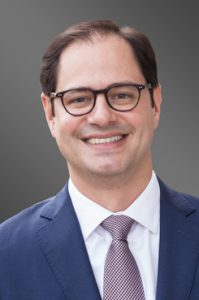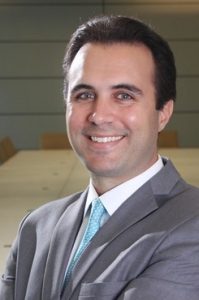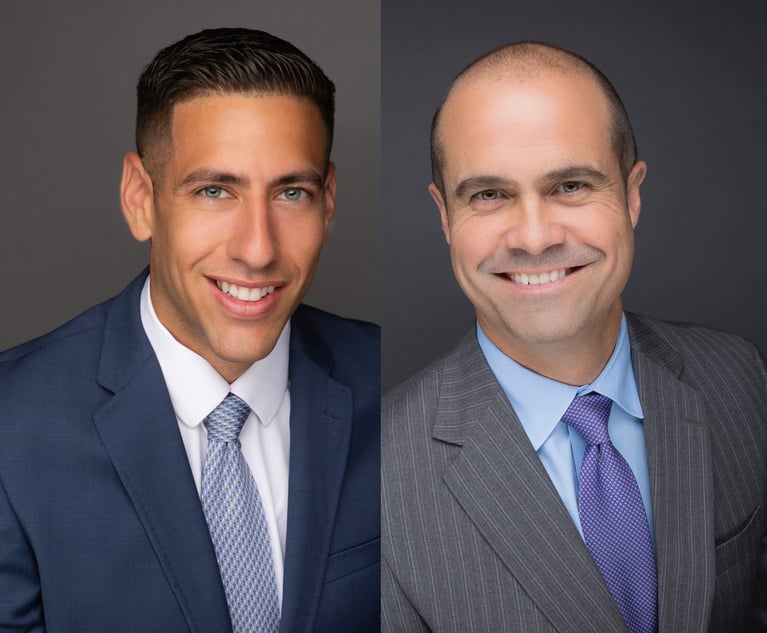It's Not Just Trump: Rich Northerners are Moving Their Billions (and Legal Work) to South Florida
The Trump administration's tax law provided the catalyst for more of the very rich to transfer their permanent residence from high-tax states like New York to states known for their lower tax burden — like Florida.
November 22, 2019 at 02:11 PM
7 minute read
 Miami skyline / Photo by Shutterstock.com
Miami skyline / Photo by Shutterstock.com
A recent influx of very wealthy, high-profile northerners to South Florida has been a boon to Florida law firms and their attorneys as the new arrivals bring businesses and complicated legal matters with them.
Attorneys from several prominent Florida firms, including Greenberg Traurig, Akerman and Bilzin Sumberg, say they are handling an increasing number of matters for high net worth individuals and money managers who are looking to establish permanent residency in Miami.
Recent high-profile permanent residents include President Donald Trump and billionaire fund managers Carl Icahn and Barry Sternlicht.
Miami, a longtime haven for second or third homes, has built out the infrastructure — the real estate, amenities and cultural monuments — necessary to push the city over the line from vacation destination to full-time home, city boosters say.
But it was President Trump and congressional Republicans who supercharged Miami's pitch when Congress passed the Tax Cuts and Jobs Act of 2017, capping state and local income and property tax deductions at $10,000. In high-tax states like New York, earners in the top bracket now face state and local taxes of 13%.
For those looking to avoid paying high taxes, places like Miami suddenly seemed very appealing.
"They started realizing the city has changed in the past decade and they've have gotten used to this [South Florida] lifestyle," said Bilzin Sumberg partner Anthony De Yurre. "Not just quality of life and tax savings, but the business community has matured as well."
Yosbel Ibarra, co-managing partner of Greenberg Traurig's Miami office, said that his firm's clients up north have been increasingly interested in Miami.
 Yosbel Ibarra
Yosbel Ibarra"We have a private equity practice in New York that we work closely with, and we've been meeting with clients that want to move their headquarters to Miami — not just open an office," Ibarra said.
For the wealthy, establishing permanent residency in Florida is a complicated and expensive process. And once Florida becomes their professional home, the wealthy enmesh themselves in the local business community, leading to an increase in the volume of local deals. De Yurre said his clients' matters regularly touch on practice areas such as construction financing, corporate, estate planning and real estate.
"Those areas alone involve a core team of seven to 10 of our attorneys," he said.
Bilzin did complex real estate work needed for the new 144,000 square foot headquarters of Starwood Capital set to open on Miami Beach in 2021 — a project De Yurre said will need to be continually serviced by local attorneys. Deals aside, the uber-wealthy need a team of lawyers to navigate the byzantine and invasive audit that comes with shifting permanent residency outside of New York. Such an operation that can often take up to two years.
 Anthony De Yurre
Anthony De Yurre"The more of a big whale they are, the more of a likelihood they have complex structures for their assets," De Yurre said. "Where is their aircraft located? Is it in Opa-locka or New York? Where is their $10 million art? Where's it insured? Where are the children going to school? Who's their primary doctor?"
New York is still the undisputed capital for the ultra-wealthy and home to the most robust financial market in the country. Many funds still rely on their long-time New York attorneys and white-shoe firms to handle their largest deals, even after they've moved to Florida.
According to November data from the U.S. Securities and Exchange Commission, New York City is home to 1,961 SEC-registered investment advisers. Miami and Miami Beach, on the other hand, boast only 121. Although the number is comparatively small, the figure is nearly four times greater than in 2013, when the city was home to only 32 investment advisers.
The Miami Roadshow
For years, the Miami Downtown Development Authority (DDA) has been aggressively courting ultra-wealthy northerners and companies with narratives of beachfront vistas, booming real estate and, perhaps the most compelling argument — low taxes. Since 2013, the taxpayer-funded organization has sent envoys to pitch South Florida to fund managers and companies up north in Chicago, New York, New Jersey, and Connecticut.
The DDA caught its first big fish a year later when Universa Investments announced it was moving its headquarters from Los Angeles to Miami. Sternlicht and his fund, Starwood Capital Group, moved from Connecticut to Miami in 2016. And in 2015, billionaire David Tepper shifted his taxable income to Florida and opened a small office for his firm, Appaloosa Management LP, in the South Beach area of Miami Beach.
The Miami roadshow has brought back solid results. Miami is now home to at least 60 international banks and over 100 investment firms, according to DDA data. Between 2013 and 2018, the total value of assets under management in downtown Miami has grown from $47 billion to $75 billion.
DDA board member and Miami real estate developer Nitin Motwani said that the city's cultural development in the last 15 years has been one of the most enticing factors in swaying potential transplants. The luxury housing boom has led to a large stock of high-end houses and condos, often at 40% markdowns compared to other cities, he said. The Adrienne Arsht Center for the Performing Arts opened in 2006; The Phillip and Patricia Frost Museum opened in 2017.
"Miami has evolved into an international gateway city," Motwani said. "Our culture, community and talent base caught up."
But what has tipped the scales is the government cap on state and local tax deductions, also known as SALT deductions, which effectively raised income taxes for the ultra-wealthy in high-tax states such as California, Illinois, New Jersey and New York.
In Connecticut, which relied on its top 100 filers to pay $1.13 billion in income tax in 2017, according to the Wall Street Journal, the elimination of the deduction amounts to an additional income tax liability of $2.8 billion per year for its residents.
Only after the tax changes did Icahn, by far the biggest name to announce a South Florida relocation, decide to leave New York. I Squared Capital, a $12 billion private equity fund, relocated its headquarters to Miami in late 2018.
"When President Trump decided to change the SALT deduction it added icing on the cake," Motwani said. "Suddenly several companies we've been speaking to for years called us up and as a result, we've seen a lot of firms move down."
To be sure, it's still too early to declare Miami a true domestic financial hub and permanent home for the wealthy. Outside of the anecdotal evidence, some big names and DDA data that precedes the tax law, there's little in the way of hard numbers to gauge the impact of the law until states release comprehensive 2018 tax data.
Still, there are signs. Take, for example, the lengthening waiting lists for Miami's most prestigious private schools. De Yurre said he's working with a developer who is looking to build a new private school in Miami. Although he wouldn't divulge the name of the school, De Yurre said it has a "brand that's known in New York" and will charge New York private school tuition rates — between $50,000 and $60,000 per year.
"Fifty thousand dollars is not a normal Miami tuition so it's something that tells you that the city has reached a different level," he said. "It's not just the Icahns. There are people that are underneath that have their own gravity and wealth that are already in Miami. The question is how long they spend down here."
This content has been archived. It is available through our partners, LexisNexis® and Bloomberg Law.
To view this content, please continue to their sites.
Not a Lexis Subscriber?
Subscribe Now
Not a Bloomberg Law Subscriber?
Subscribe Now
NOT FOR REPRINT
© 2025 ALM Global, LLC, All Rights Reserved. Request academic re-use from www.copyright.com. All other uses, submit a request to [email protected]. For more information visit Asset & Logo Licensing.
You Might Like
View All

Local Boutique Expands Significantly, Hiring Litigator Who Won $63M Verdict Against City of Miami Commissioner
3 minute read
Greenberg Traurig Combines Digital Infrastructure and Real Estate Groups, Anticipating Uptick in Demand
4 minute read
As Unpredictability Rises, Gov't Law Practices Expect Trump Bump. Especially in Florida
5 minute readLaw Firms Mentioned
Trending Stories
- 15th Circuit Considers Challenge to Louisiana's Ten Commandments Law
- 2Crocs Accused of Padding Revenue With Channel-Stuffing HEYDUDE Shoes
- 3E-discovery Practitioners Are Racing to Adapt to Social Media’s Evolving Landscape
- 4The Law Firm Disrupted: For Office Policies, Big Law Has Its Ear to the Market, Not to Trump
- 5FTC Finalizes Child Online Privacy Rule Updates, But Ferguson Eyes Further Changes
Who Got The Work
J. Brugh Lower of Gibbons has entered an appearance for industrial equipment supplier Devco Corporation in a pending trademark infringement lawsuit. The suit, accusing the defendant of selling knock-off Graco products, was filed Dec. 18 in New Jersey District Court by Rivkin Radler on behalf of Graco Inc. and Graco Minnesota. The case, assigned to U.S. District Judge Zahid N. Quraishi, is 3:24-cv-11294, Graco Inc. et al v. Devco Corporation.
Who Got The Work
Rebecca Maller-Stein and Kent A. Yalowitz of Arnold & Porter Kaye Scholer have entered their appearances for Hanaco Venture Capital and its executives, Lior Prosor and David Frankel, in a pending securities lawsuit. The action, filed on Dec. 24 in New York Southern District Court by Zell, Aron & Co. on behalf of Goldeneye Advisors, accuses the defendants of negligently and fraudulently managing the plaintiff's $1 million investment. The case, assigned to U.S. District Judge Vernon S. Broderick, is 1:24-cv-09918, Goldeneye Advisors, LLC v. Hanaco Venture Capital, Ltd. et al.
Who Got The Work
Attorneys from A&O Shearman has stepped in as defense counsel for Toronto-Dominion Bank and other defendants in a pending securities class action. The suit, filed Dec. 11 in New York Southern District Court by Bleichmar Fonti & Auld, accuses the defendants of concealing the bank's 'pervasive' deficiencies in regards to its compliance with the Bank Secrecy Act and the quality of its anti-money laundering controls. The case, assigned to U.S. District Judge Arun Subramanian, is 1:24-cv-09445, Gonzalez v. The Toronto-Dominion Bank et al.
Who Got The Work
Crown Castle International, a Pennsylvania company providing shared communications infrastructure, has turned to Luke D. Wolf of Gordon Rees Scully Mansukhani to fend off a pending breach-of-contract lawsuit. The court action, filed Nov. 25 in Michigan Eastern District Court by Hooper Hathaway PC on behalf of The Town Residences LLC, accuses Crown Castle of failing to transfer approximately $30,000 in utility payments from T-Mobile in breach of a roof-top lease and assignment agreement. The case, assigned to U.S. District Judge Susan K. Declercq, is 2:24-cv-13131, The Town Residences LLC v. T-Mobile US, Inc. et al.
Who Got The Work
Wilfred P. Coronato and Daniel M. Schwartz of McCarter & English have stepped in as defense counsel to Electrolux Home Products Inc. in a pending product liability lawsuit. The court action, filed Nov. 26 in New York Eastern District Court by Poulos Lopiccolo PC and Nagel Rice LLP on behalf of David Stern, alleges that the defendant's refrigerators’ drawers and shelving repeatedly break and fall apart within months after purchase. The case, assigned to U.S. District Judge Joan M. Azrack, is 2:24-cv-08204, Stern v. Electrolux Home Products, Inc.
Featured Firms
Law Offices of Gary Martin Hays & Associates, P.C.
(470) 294-1674
Law Offices of Mark E. Salomone
(857) 444-6468
Smith & Hassler
(713) 739-1250






